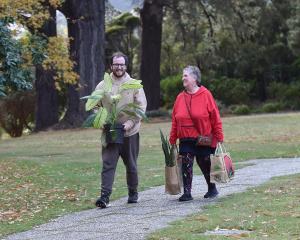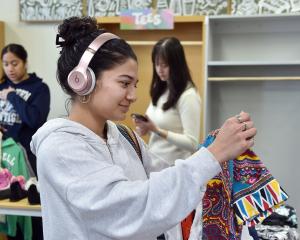As the number of ethnic grocery stores in Dunedin burgeons, competition becomes stiffer, but more outlets mean increased diversity, one retailer says.
Harjit Singh runs one of Dunedin's oldest Indian grocery stores, Indian Food Mart, in St Andrew St. Mr Singh, a mechanical engineer from Northern India, said ''competition is stiff now in Dunedin'' and he mainly worked ''to pass the time and keep myself occupied. There is hardly any money in it.
''A lot of Asian grocers have opened up in the last few years, and I think that's because Kiwis are travelling so much and getting a taste for our food,'' Mr Singh said.
''Eighty percent of my customers are Kiwi. Although there are quite a few of us [Asian grocery stores], we are still cheaper than the supermarket and can give people advice on how to cook our food.''
Mr Singh said his biggest sales were dried fruits and nuts and fresh vegetables such as okra, eggplant, green chillies, curry leaves, fresh turmeric and coriander. All Mr Singh's packaged goods are packed by workers from Cargill Enterprises, which Mr Singh said had helped him form strong ties with the community.
''A lot of people are buying their ingredients online or importing from Auckland or Christchurch, but that's not the same experience as coming in here and smelling everything and learning how to cook it,'' he said.
Indian Save Mart in South Dunedin was opened a year ago by Sujith John, who decided to get into the grocery business after being unable to find work in the automotive industry.
He said that before launching the business he researched Dunedin's ethnic grocery scene and found a gap in the market for South Indian products.
''The Indian store on St Andrew St is run by a North Indian and has largely North Indian goods, and the Indian store near the Oval is largely Fijian-Indian.
''My shop has 75% South Indian goods, and 25% the same as the other stores,'' he said.
Mr John said business was ''OK'' and his customers were a 50-50 split between New Zealanders and South Indians. He estimated there were more than 100 South Indian families in Dunedin.
''There is definitely quite a lot of competition but I think there is a lot of interest in our food, and we all offer something different, so we can all survive,'' Mr John said.
University of Otago emeritus professor of anthropology Helen Leach said New Zealanders' palettes started to diversify after World War 2 when soldiers returned with a taste for more exotic foods.
''As a country, we are always very interested in exotic things,'' Prof Leach said.
''The war and immigration were instrumental in opening our minds to different food cultures, but travel, magazines and TV have also played a part.''
Prof Leach said it ''doesn't matter'' if the ethnic food we cook and eat does not taste the same as it would in its country of origin, as ''food is constantly evolving ... That's why it's exciting.''
- by Eleanor Ainge Roy












